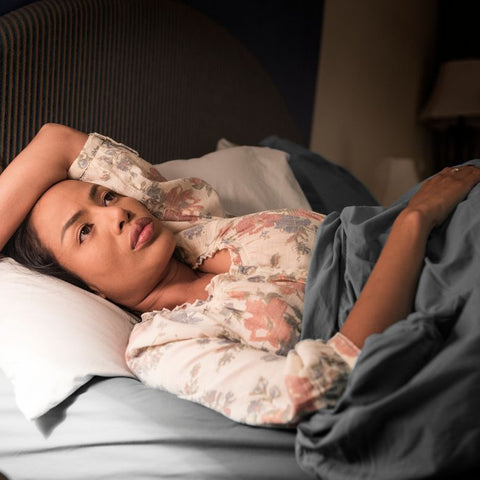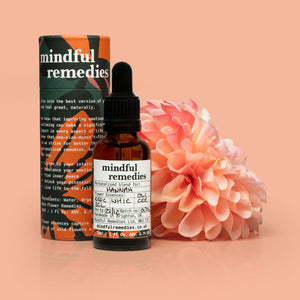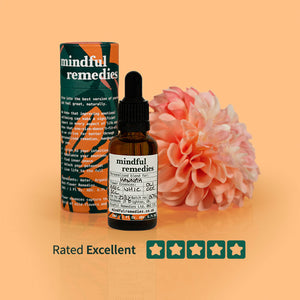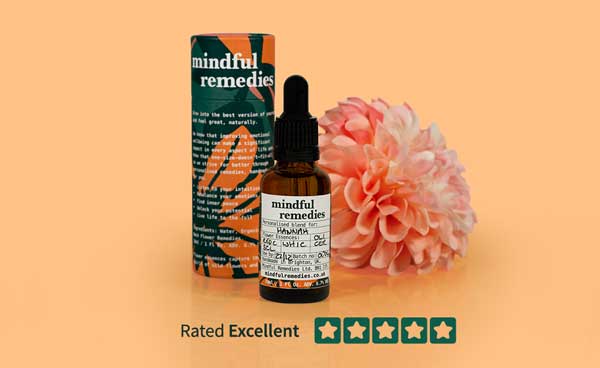your basket
- choosing a selection results in a full page refresh

Are you one of the many women suffering from menopause sleep problems? Are you struggling with insomnia or restless nights? If so, you're not alone. Millions of women are going through the same thing. But don't despair – there are natural remedies available that can help. One such remedy is Bach flowers. Read on to learn more about Bach flowers and how they can help improve your sleep naturally during menopause.
Sleep problems are common during menopause when women experience a decline in oestrogen levels. The most common sleep problem during menopause is insomnia, which can cause fatigue, irritability, and difficulty concentrating. Other sleep problems associated with menopause include night sweats and hot flashes, both of which can disrupt sleep and cause discomfort. Some women also find that their sleep is disturbed by anxiety or depression during menopause. Sleep problems can be aggravated by stress, so it is important to find ways to relax and unwind before bedtime. Practising yoga or meditation, reading a book, or taking a warm bath can all help to promote stress reduction and better sleep during menopause, as well as Bach flower remedies which we discuss further here.

Bach flower remedies are natural remedies made using the essence of certain high vibration flowers. They were discovered in the 1930s by Dr Bach a physician and homeopath. He created 38 different flower remedies, each treating a different emotion. For example, Rock Rose can help with panic attacks or nightmares and Elm can help with feelings of overwhelm. They can help with the full range of emotions that we go through in life – anxiety, depression, confidence, motivation, stress and more. Plus sleeping difficulties of course!
Flower remedies work on an energy or vibrational principle. There are no physical remains of the flower within the essence, just the energy imprint of the individual flower or tree. The remedies work on the energetic levels of your body. They work on the principle that the vibrational energy from flowers and trees remind your body how to be and brings your body’s energy back into balance.
They can often be particularly helpful during transition periods in life when we’re dealing with change. This can bring up various emotions or we can be stuck in the past unable to move forward. This is why they can be particularly helpful for sleeping problems during the menopause.
You can work with up to seven remedies at any one time. Through Mindful Remedies you can create your own personalised blend choosing from any of the 38 original Bach remedies.

Bach flower remedies are completely natural, with no side effects or withdrawal effects. They can be taken alongside existing medication and can often be complementary to other forms of treatment for mental health or emotional wellbeing. They are a gentle, holistic form of treatment and are safe to take by people of all ages including pregnant women and babies. Unlike sleeping medications, they will not make you feel drowsy the next morning or give you a sleeping pill hangover.
You can read here our full list of benefits of Bach flower remedies for mental health.
Menopause can be a difficult time for many women, both physically and emotionally. One of the most common issues women face during menopause is sleep problems. While there are many possible causes of insomnia during menopause, the good news is that there are also a number of Bach flower remedies that can help the individual emotional issues that you may be going through, be that an overactive mind, stress or anxiety. Here we detail the main Bach flower remedies you might want to consider for menopause sleep problems –
White Chestnut
This is the classic remedy for insomnia (whether that be driven by menopause or not.) You need White Chestnut if you have an overactive mind which whirs non-stop, worrying with no respite or playing things over and over in your mind. This remedy will help bring a calm and controlled mind.
Walnut
The Walnut Bach remedy is brilliant during times of change or transitions of life. It helps if you’re feeling a little unsettled or are having trouble breaking free from past ties or relationships perhaps. If you need help moving forward with clear goals and staying true to yourself, try Walnut.
Mimulus
This is one of a few remedies for anxiety. Mimulus is for if you’re feeling anxious about something specific (a known cause) for example health or money anxieties.
Aspen
Aspen, on the other hand, is for anxieties which have no known reason. It is more a general sense of uneasiness, apprehension or foreboding.
Rock Rose
Rock Rose is for feelings of anxiety which are very strong – a real sense of panic or terror. This can often be accompanied by panic attacks or nightmares.
Mustard
Mustard would be the flower remedy for if you’re sleeping issues are caused by depression or low mood which comes and goes like a black cloud, for no particular reason. It appears and leaves without any notice but can have a huge impact on your daily life as you’re unable to hide it.
Cherry Plum
This is the remedy for if you feel like you’re feeling like you’re on the verge of a breakdown, like a ticking time bomb and you may lose control at any minute. You feel at the end of your tether. This remedy is also helpful for jaw clenching.
Read this blog for recommendations if you’re suffering from mood swings during menopause.
There can be many emotional issues which play a part in sleeping problems during menopause. We recommend browsing through the full list of remedies we’ve highlighted that may help during the menopause. We’ve tried to curate a list of remedies that may be helpful during this period.
Bach Flower essences are safe, gentle, and non-addictive, making them an ideal choice for women experiencing menopause sleep problems. In addition, they are easy to use and can are taken in liquid form.
The remedies are taken by mouth, as drops under the tongue or in a glass of water. The minimum dose is four drops, four times a day. However, you can’t overdose on them so feel free to use your intuition and use more frequently if you’re feeling particularly stressed / anxious / depressed…. Or whatever emotions you’re trying to work on. You should aim to take the remedies first thing in the morning and last thing at night, plus at least two other times during the day.
A treatment bottle lasts approximately three weeks if you take at the recommended dose. During this period you should start to feel the rebalancing effects of the remedies. At the end of the three weeks you may still have some emotions that need to be worked on. Take some time to think about how you’re feeling now. What has shifted and what is still lingering? Then re-select your remedies again (or speak to a Bach practitioner for recommendations.)
Through Mindful Remedies you can create a personalised bottle choosing up to seven remedies in a bottle. Alternatively, you can book an online consultation with Lucy, a qualified and registered Bach practitioner and she will recommend the remedies you need.
Some helpful links are below –
Create a remedy (full 38 list)

Since 2021, Lucy Edwards, a qualified Bach Flower Practitioner and the driving force behind Mindful Remedies, has connected with clients across the world. Crafting thousands of personalised remedies, Lucy has supported individuals' emotional wellbeing, shipping remedies to far-flung places like the USA, Thailand, and Australia.
Lucy is readily available for conversations, offering personalised advice to guide you on the path to holistic wellness. It's important to note that she's not only qualified but also registered with the Bach Centre, ensuring that every consultation and remedy adheres to Dr Bach’s original guidelines for expert care and efficacy.
Exclusive pricing 20% off your first subscription order and 5% off all future orders
VIP treatment Receive personalised advice from Lucy, free gifts & 15% off gift vouchers
Easy to manage Edit remedy, change schedule, pause or cancel at any time
Exclusive online workshops Access to workshops focusing on emotional wellbeing, guided by Lucy
Early access to new products Be the first to try out new remedies or wellness products, before anyone else



